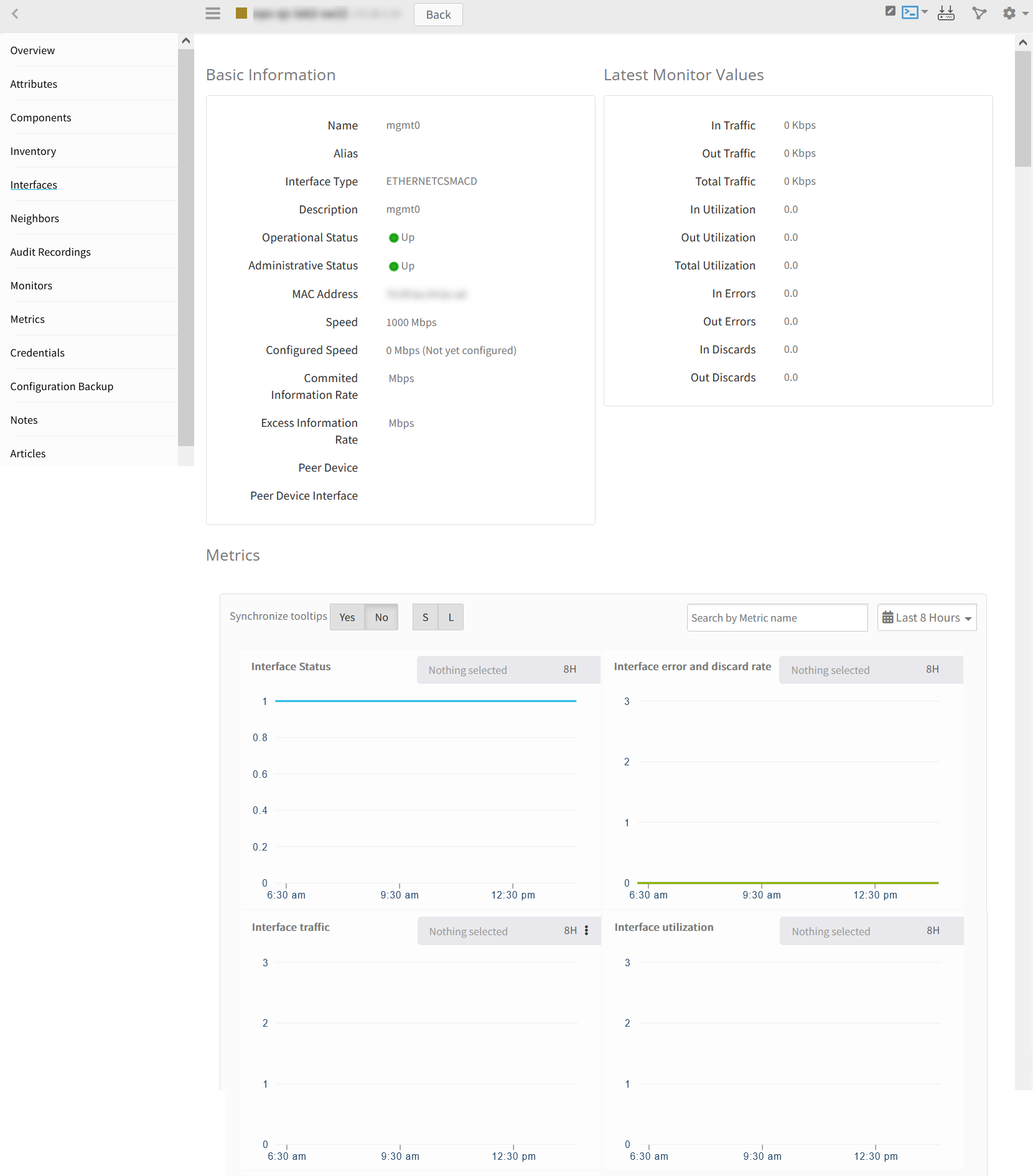Introduction
The infrastructure workspace provides a 360-degree view of all the resources available in the managed environment.
The Resource details screen provides dynamic monitoring of the entire infrastructure from network devices to services running in cloud or dedicated hosts to containers running in orchestrated environments.
Designed for modern operations team, the real-time data collection of the managed resources facilitates a round-the-clock vigilance on the managed resources.
The Resources tab gives you an insight to a complete view of resources in your environment. A graphical view of your resources can also be viewed in Dashboards. For more details on inventory widgets, view Dashboards.
The Resources page is divided into the following parts:
- Menu: Lists the menu available in Infrastructure Workspace.
- Resource Categories: Displays a list of resource categories to which the resources belong, the discovered resources and the unmanaged resources. The numbers indicate the total number of resources belonging to the category.
- Availability status bar: Displays the availability status of the resources.
- Search bar: Displays Search options.
- Settings: Provides settings options for resource category and individual resources such as add, delete or assign templates.
- Resource Display: Displays the details of the resources.
View resource details
The Resources page displays the resource category, number of resources belonging to each category and the general attributes of the resources.
To view the details of the resource type:
- Click the name of the Resource type.
A list of all the resources is displayed. By default, details such as Name, IP Address, Operating System, Resource Type, Associated Alert, Associated Incident, Associated Groups, Last Updated, and associated topology in traits are displayed. - Click the settings icon on the top right corner to add or remove the displayed attribute columns for resources.
- Click the number in front of the resource type to view further categorization of resources.
The attributes of the resources are displayed. - Click the name, IP address, or any other clickable attribute to see the details of that resource.
The resource category page lists the properties of the resource.
Resource properties
The various properties of a resource are displayed in the resource category pane. The following properties are common. However, properties can differ according to the type of resource selected.
| Property | Description |
|---|---|
| Overview | Displays the overall performance and the Availability of the resource. |
| Attributes | Displays basic information such as Name, Resource Type, Make, Model and Resource UUID. Some other attributes displayed are Custom Attributes, SKUs, and Hardware information. |
| Virtual Machine | Displays the statuses of the virtual machines. |
| Monitors | Displays the monitors and templates assigned to the resource. You can assign/unassign templates, assign/unassign monitors and assign Availability rule. |
| Metrics | Displays the graphical representation of the performance of the metrics. |
| Credentials | Displays the credentials associated with the resource. |
| Notes | Displays notable information about the resource. |
| Impacted Resources | Displays the resources that are dependent or depend on the displayed resource. You can add or change the impacted resources. |
| Inventory | Displays the physical components and Software Modules in a network. |
| Interfaces | Displays all the interface components in a network. |
| Neighbors | Displays the VLAN number, Neighborhood device, MAC address, Neighborhood Interface and bandwidth of the Interfaces belonging to the network. |
Display of Resource Monitored Data
The monitored data of the device(s) is presented in various places in OpsRamp. The data that is monitored within the past week is shown with the most recent timestamps and values.
The Last monitored time is displayed on the Infrastructure > Resources > Overview screen.
The Resource overview screen displays the values based on the below scenarios:
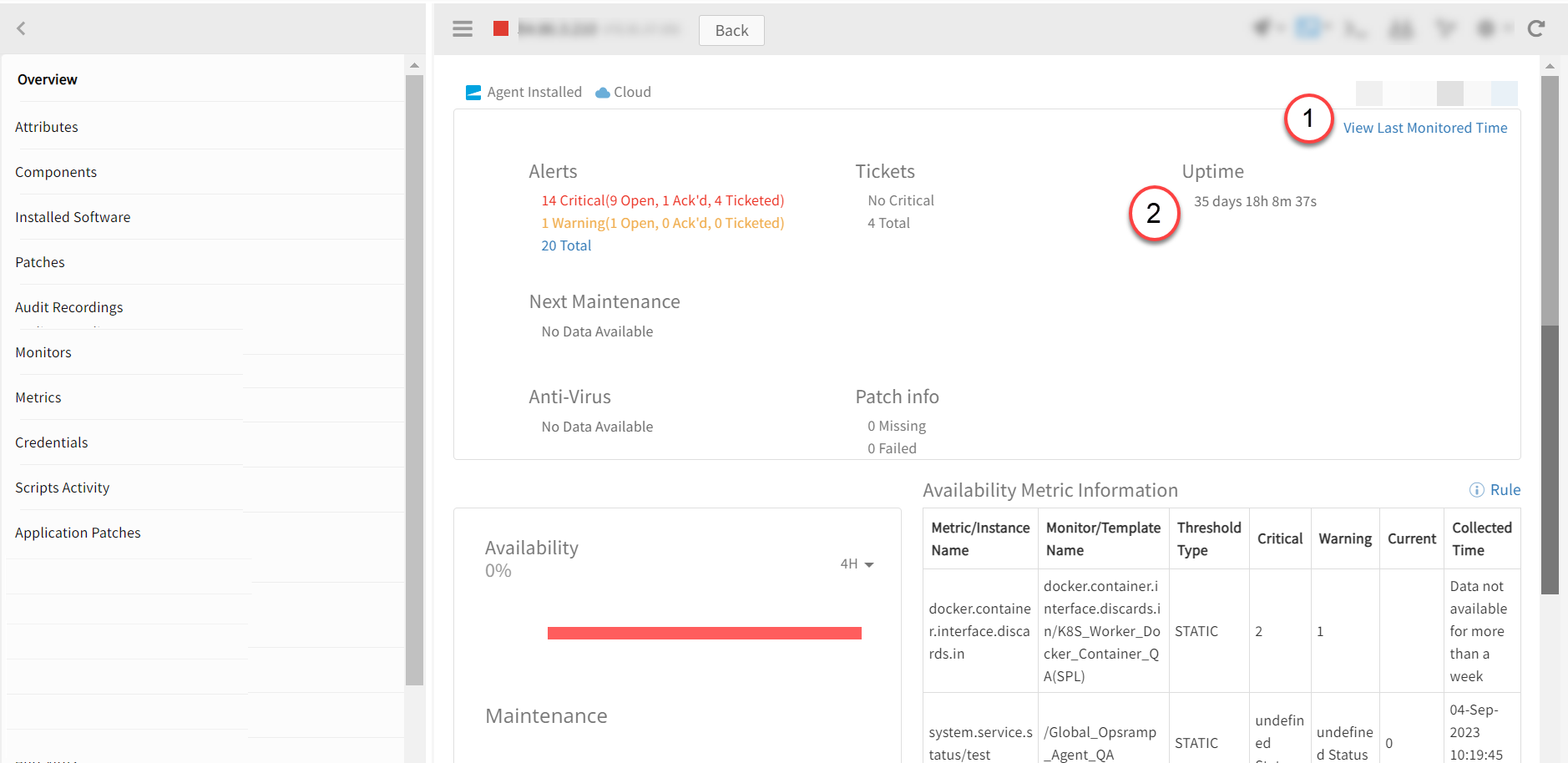
View Last Monitored Time
The last monitored time of a device is shown only for the past one week.
| Callout | Scenario/Description | Value |
|---|---|---|
| 1 | Device was created within the past one week and it is monitored successfully. | Last updated value (Date and Time). |
| Device was created more than a week ago and it is monitored successfully. | Last updated value (Date and Time). | |
| Device was created within the past one week and it is not monitored. | Empty | |
| Device was created more than a week ago and it is not monitored. | Data not available for more than a week. |
Other places where the Last monitored time is displayed:
View the Last monitored time on the Resources > Attributes screen.
Navigate to Infrastructure > Resources > Attributes.

View the Last Monitored At (IST) values on the Resources > Monitors > Monitors tab screen.
Navigate to Infrastructure > Resources > Monitors > Monitors tab.
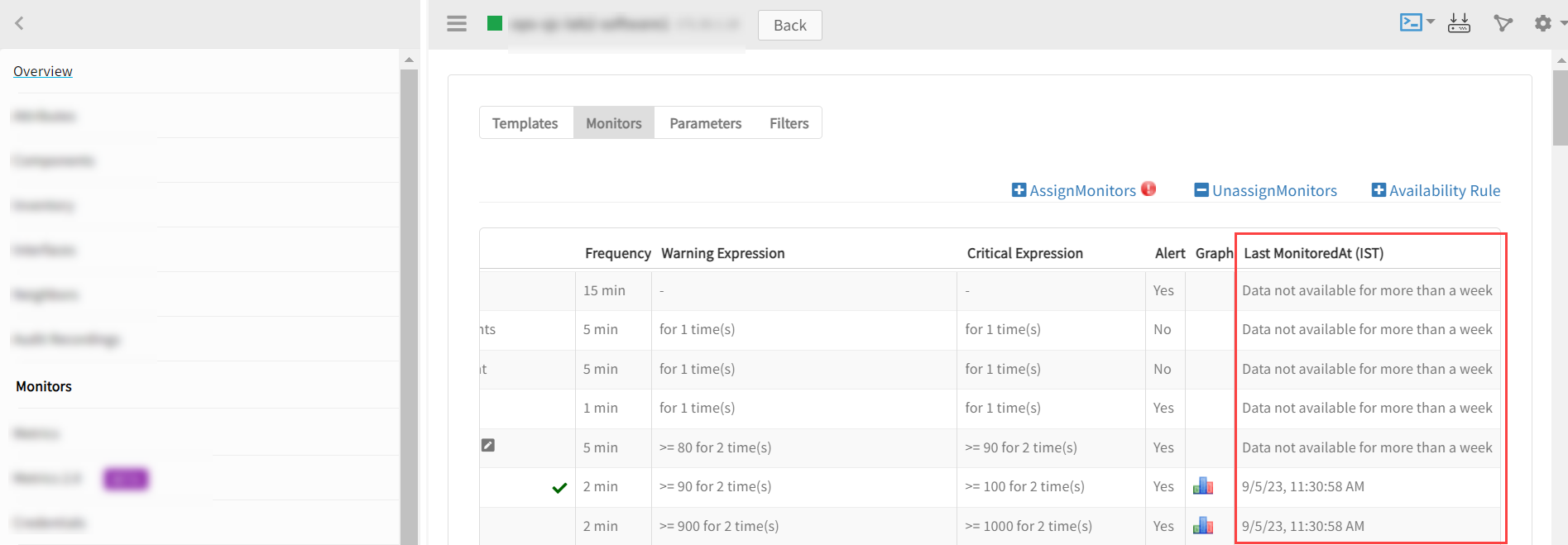
For VMware type of resource, the last monitored time is displayed for the VMWare host:
Navigate to Infrastructure > VMware > vCenter > Compute > Datacenter > Cluster > Host > Monitors > Monitors tab.
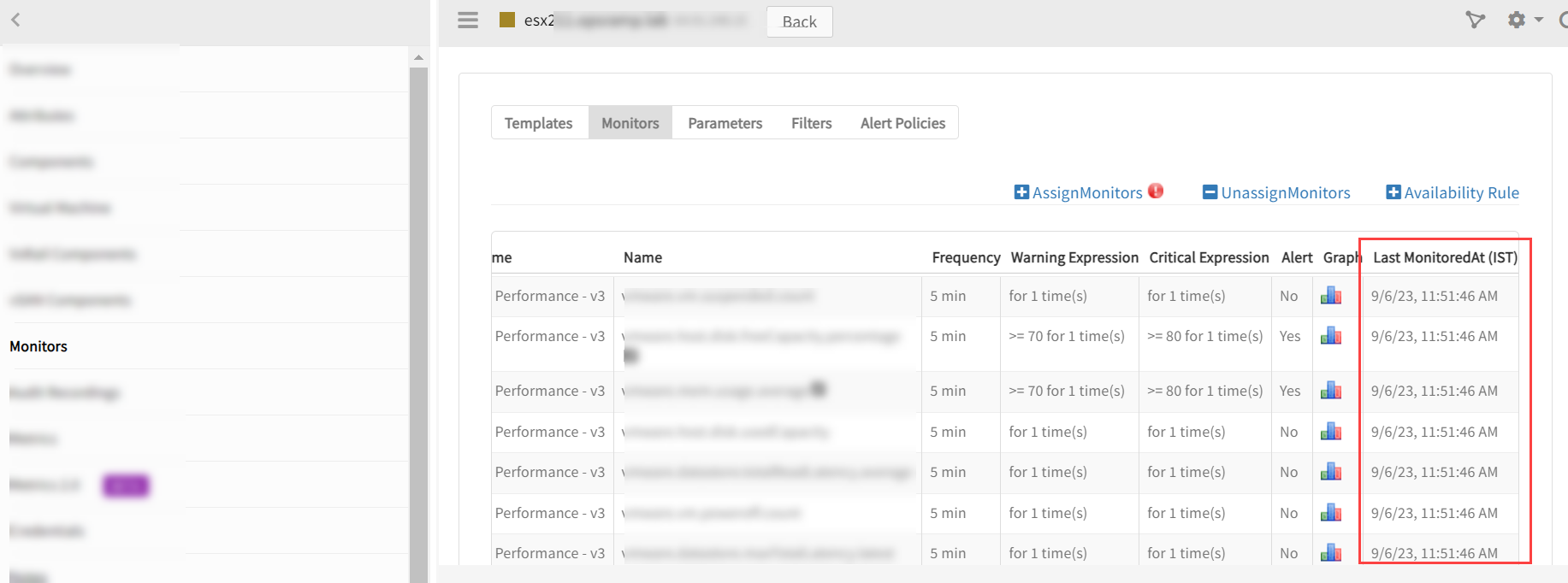
Uptime
The resource has an Uptime monitor applied, and the system.uptime metric data for the past one week is fetched.
The Resource overview screen displays the values based on the below scenarios:
| Callout | Scenario/Description | Value |
|---|---|---|
| 2 | Data exists within the past one week. | The value is converted in the Days, Hours, Minutes and Seconds format. Example: 151 days 6h 49m 55s |
| Data does not exist. | Data not available for more than a week. | |
| Resource does not have the UPTIME monitor applied. | No data available. |
Monitored components
Fetch the live monitored components of a resource for the past one week.
Navigate to Infrastructure > Resources > Monitors > Monitors tab > Edit Metric Custom Notifications and Thresholds and click Fetch Monitored components in the Component Threshold category.
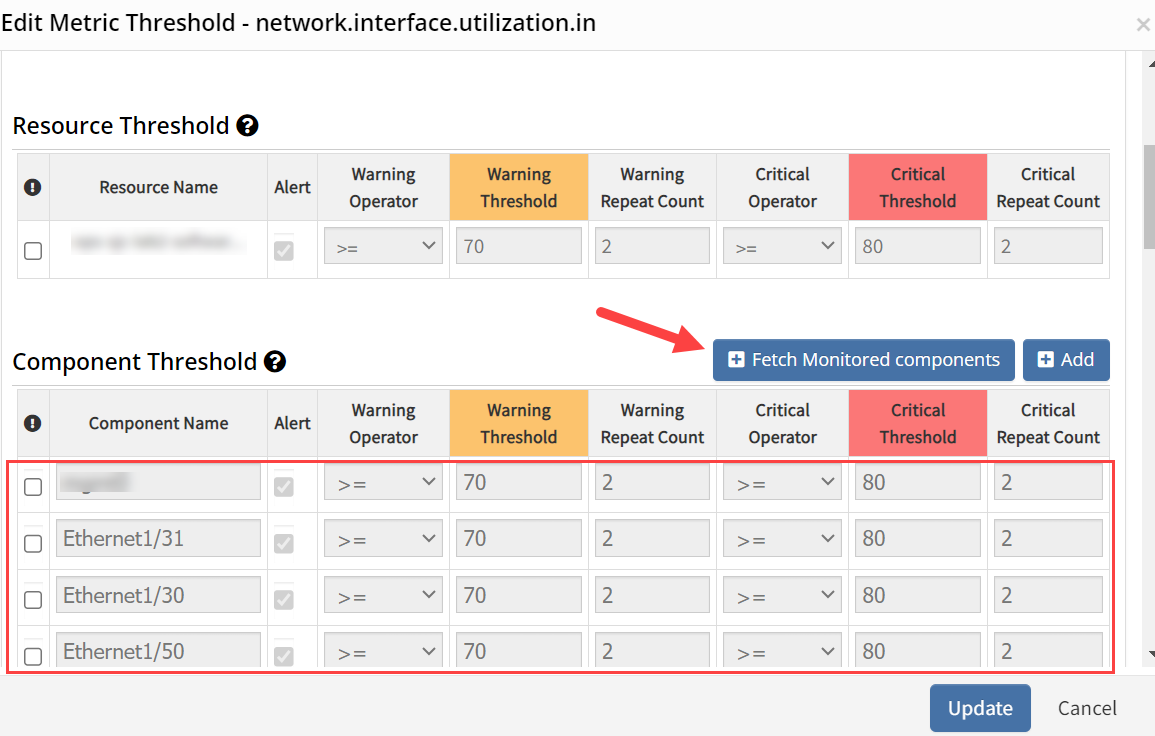
Interface graphs
Only one-week live component metric data is shown in Interface graphs.
Navigate to Infrastructure > Network Device > Interfaces > interface name.
